
List of Oregon state symbols
Encyclopedia

Oregon
Oregon is a state in the Pacific Northwest region of the United States. It is located on the Pacific coast, with Washington to the north, California to the south, Nevada on the southeast and Idaho to the east. The Columbia and Snake rivers delineate much of Oregon's northern and eastern...
has 26 official emblems, as designated by the Oregon State Legislature
Oregon Legislative Assembly
The Oregon Legislative Assembly is the state legislature for the U.S. state of Oregon. The Legislative Assembly is bicameral, consisting of an upper and lower house: the Senate, whose 30 members are elected to serve four-year terms; and the House of Representatives, with 60 members elected to...
. Most of the symbols are listed in Title 19, Chapter 186 of the Oregon Revised Statutes
Oregon Revised Statutes
The Oregon Revised Statutes is the codified body of statutory law governing the U.S. state of Oregon, as enacted by the Oregon Legislative Assembly, and occasionally by citizen initiative...
(2007 edition). Oregon's first symbol was the motto Alis Volat Propriis, written and translated in 1854. Latin
Latin
Latin is an Italic language originally spoken in Latium and Ancient Rome. It, along with most European languages, is a descendant of the ancient Proto-Indo-European language. Although it is considered a dead language, a number of scholars and members of the Christian clergy speak it fluently, and...
for "She Flies With Her Own Wings", the motto remained unchanged until 1957, when "The Union" became the official state motto. Alis Volat Propriis became the state motto once again in 1987. Originally designed in 1857, usage of the Oregon State Seal began after Oregon became the 33rd state of the United States on February 14, 1859. The motto and seal served as Oregon's only symbols until over 50 years later, when the Oregon-grape
Oregon-grape
Oregon-grape is an evergreen shrub related to the barberry. Some authors place Mahonia in the barberry genus, Berberis...
became the state flower in 1899. Oregon had six official symbols by 1950 and 22 symbols by 2000. The newest symbol of Oregon is Jory soil
Jory (soil)
The Jory series consists of very deep, well-drained soils that formed in colluvium derived from basic igneous rock. These soils are in the foothills surrounding the Willamette Valley. They have been mapped on more than in western Oregon...
, declared the state soil in 2011.
While some of the symbols are unique to Oregon, others are used by multiple states. For example, the Western Meadowlark
Western Meadowlark
Not to be confused with Eastern MeadowlarkThe Western Meadowlark is a medium-sized icterid bird, about 8.5 in long. It nests on the ground in open country in western and central North America. It feeds mostly on insects, but also seeds and berries...
, Oregon's state bird, is also an official symbol for Kansas, Montana, Nebraska, North Dakota and Wyoming. The North American Beaver
American Beaver
The North American Beaver is the only species of beaver in the Americas, native to North America and introduced to South America. In the United States and Canada, where no other species of beaver occurs, it is usually simply referred to as "beaver"...
is also the state animal of New York, and the chinook salmon
Chinook salmon
The Chinook salmon, Oncorhynchus tshawytscha, is the largest species in the pacific salmon family. Other commonly used names for the species include King salmon, Quinnat salmon, Spring salmon and Tyee salmon...
(sometimes known as the king salmon) is also the state fish of Alaska. The square dance
Square dance
Square dance is a folk dance with four couples arranged in a square, with one couple on each side, beginning with Couple 1 facing away from the music and going counter-clockwise until getting to Couple 4. Couples 1 and 3 are known as the head couples, while Couples 2 and 4 are the side couples...
and milk are commonly used state dances and state beverages, respectively.
State symbols
| Type | Symbol | Description | Adopted | Image | Note |
|---|---|---|---|---|---|
| Animal | American Beaver (Castor canadensis) |
Found in most of the larger streams and rivers in Oregon, the beaver is the largest of the North American rodent Rodent Rodentia is an order of mammals also known as rodents, characterised by two continuously growing incisors in the upper and lower jaws which must be kept short by gnawing.... s. Once overtrapped by early settlers and prized for its fur Fur Fur is a synonym for hair, used more in reference to non-human animals, usually mammals; particularly those with extensives body hair coverage. The term is sometimes used to refer to the body hair of an animal as a complete coat, also known as the "pelage". Fur is also used to refer to animal... , populations have recovered through management and partial protection. Oregon is known as "The Beaver State" and Oregon State University Oregon State University Oregon State University is a coeducational, public research university located in Corvallis, Oregon, United States. The university offers undergraduate, graduate and doctoral degrees and a multitude of research opportunities. There are more than 200 academic degree programs offered through the... 's athletic teams are called the Beavers Oregon State Beavers The Oregon State Beavers is a name shared by all sports teams at Oregon State University in Corvallis, Oregon. The Beavers are part of the Pacific-12 Conference . Oregon State's mascot is Benny the Beaver... . |
1969 | 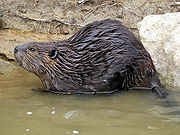 |
|
| Beverage | Milk | Milk was recognized as the state's beverage because the production and manufacture of dairy products are major contributors to Oregon's economy. Tillamook County is particularly known for its dairy farms. Water had also been proposed as the state beverage in the same legislative session, but that proposal was tabled in favor of the milk legislation. | 1997 |  |
|
| Bird | Western Meadowlark Western Meadowlark Not to be confused with Eastern MeadowlarkThe Western Meadowlark is a medium-sized icterid bird, about 8.5 in long. It nests on the ground in open country in western and central North America. It feeds mostly on insects, but also seeds and berries... (Sturnella neglecta) |
Chosen as the state bird in 1927 by Oregon's school children in a poll sponsored by the Oregon Audubon Society, the Western Meadowlark is native throughout western North America and is known for its "distinctive and beautiful song." | 1927 | 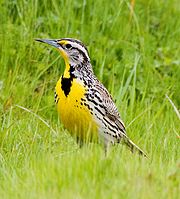 |
|
| Crustacean | Dungeness crab Dungeness crab The Dungeness crab, Metacarcinus magister , is a species of crab that inhabits eelgrass beds and water bottoms on the west coast of North America. It typically grows to across the carapace and is a popular seafood... (Cancer magister) |
Based on lobbying from school children at Sunset Primary School in West Linn, Oregon West Linn, Oregon West Linn is a city in Clackamas County, Oregon, United States. Now a prosperous southern suburb of Portland, West Linn has a history of early development, prompted by the opportunity to harvest energy from nearby Willamette Falls. It was named after Senator Dr. Lewis Fields Linn of Ste... , and citing its importance to the Oregon economy, the Oregon State Legislature designated the Dungeness crab as the state crustacean in 2009. |
2009 |  |
|
| Dance | Square dance Square dance Square dance is a folk dance with four couples arranged in a square, with one couple on each side, beginning with Couple 1 facing away from the music and going counter-clockwise until getting to Couple 4. Couples 1 and 3 are known as the head couples, while Couples 2 and 4 are the side couples... |
A folk dance Folk dance The term folk dance describes dances that share some or all of the following attributes:*They are dances performed at social functions by people with little or no professional training, often to traditional music or music based on traditional music.... with four couples (eight dancers) arranged in a square, the "lively spirit of the [square] dance exemplifies the friendly, free nature and enthusiasm that are a part of the Oregon Character." The Oregon Waltz had been proposed as the state waltz in 1997, but the proposal was rejected. |
1977 |  |
|
| Father | Dr. John McLoughlin John McLoughlin Dr. John McLoughlin, baptized Jean-Baptiste McLoughlin, was the Chief Factor of the Columbia Fur District of the Hudson's Bay Company at Fort Vancouver. He was later known as the "Father of Oregon" for his role in assisting the American cause in the Oregon Country in the Pacific Northwest... |
McLoughlin was the Chief Factor Factor (agent) A factor, from the Latin "he who does" , is a person who professionally acts as the representative of another individual or other legal entity, historically with his seat at a factory , notably in the following contexts:-Mercantile factor:In a relatively large company, there could be a hierarchy,... of the Columbia Fur District Columbia District The Columbia District was a fur trading district in the Pacific Northwest region of British North America in the 19th century. It was explored by the North West Company between 1793 and 1811, and established as an operating fur district around 1810... of the Hudson's Bay Company Hudson's Bay Company The Hudson's Bay Company , abbreviated HBC, or "The Bay" is the oldest commercial corporation in North America and one of the oldest in the world. A fur trading business for much of its existence, today Hudson's Bay Company owns and operates retail stores throughout Canada... at Fort Vancouver Fort Vancouver Fort Vancouver was a 19th century fur trading outpost along the Columbia River that served as the headquarters of the Hudson's Bay Company in the company's Columbia District... . In the late 1840s his general store in Oregon City Oregon City, Oregon Oregon City was the first city in the United States west of the Rocky Mountains to be incorporated. It is the county seat of Clackamas County, Oregon... was famous as the last stop on the Oregon Trail Oregon Trail The Oregon Trail is a historic east-west wagon route that connected the Missouri River to valleys in Oregon and locations in between.After 1840 steam-powered riverboats and steamboats traversing up and down the Ohio, Mississippi and Missouri rivers sped settlement and development in the flat... . He became designated as the "Father of Oregon" for his role in assisting the American cause in the Oregon Country Oregon Country The Oregon Country was a predominantly American term referring to a disputed ownership region of the Pacific Northwest of North America. The region was occupied by British and French Canadian fur traders from before 1810, and American settlers from the mid-1830s, with its coastal areas north from... . |
1957 | 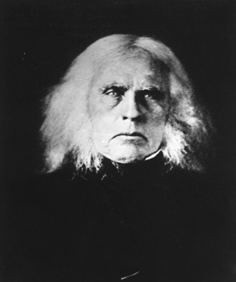 |
|
| Fish | Chinook salmon Chinook salmon The Chinook salmon, Oncorhynchus tshawytscha, is the largest species in the pacific salmon family. Other commonly used names for the species include King salmon, Quinnat salmon, Spring salmon and Tyee salmon... (Oncorhynchus tshawytscha) |
Salmon was essential for the coastal Native Americans' life, and was the subject of many legend Legend A legend is a narrative of human actions that are perceived both by teller and listeners to take place within human history and to possess certain qualities that give the tale verisimilitude... s and taboo Taboo A taboo is a strong social prohibition relating to any area of human activity or social custom that is sacred and or forbidden based on moral judgment, religious beliefs and or scientific consensus. Breaking the taboo is usually considered objectionable or abhorrent by society... s. The largest of the Pacific salmon, the chinook provides both sport and commercial fishing, but is under threat from dam Dam A dam is a barrier that impounds water or underground streams. Dams generally serve the primary purpose of retaining water, while other structures such as floodgates or levees are used to manage or prevent water flow into specific land regions. Hydropower and pumped-storage hydroelectricity are... s and fishing. |
1961 | 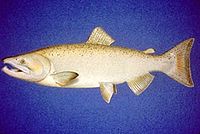 |
|
| Flag Flags of the U.S. states The flags of the U.S. states exhibit a wide variety of regional influences and local histories, as well as widely different styles and design principles. Modern state flags date from the 1890s when states wanted to have distinctive symbols at the 1893 World's Columbian Exposition in Chicago... |
Flag of Oregon Flag of Oregon The flag of the state of Oregon is a two-sided flag in navy blue and gold with an optional gold fringe. On the front is the escutcheon from the state seal and on the reverse is a gold figure of a beaver, the state animal. Oregon is the only U.S. state to have a two-sided flag.-History:The current... |
Oregon's flag Flag A flag is a piece of fabric with a distinctive design that is usually rectangular and used as a symbol, as a signaling device, or decoration. The term flag is also used to refer to the graphic design employed by a flag, or to its depiction in another medium.The first flags were used to assist... is navy blue with gold lettering and imagery, and is the only current flag in the U.S. to have a different pattern on the reverse side Flags whose reverse differs from the obverse This article concerns national, sub-national and historical flags whose reverse is, or was, at some point of their history, different from the obverse.-Soviet Union:... . The obverse depicts the state seal with "STATE OF OREGON" displayed above and "1859" displayed below (the year Oregon was admitted to The Union). The reverse depicts a beaver in the center. |
1925 |  .svg.png) |
|
| Flower | Oregon-grape Oregon-grape Oregon-grape is an evergreen shrub related to the barberry. Some authors place Mahonia in the barberry genus, Berberis... (Mahonia Mahonia Mahonia is a genus of about 70 species of evergreen shrubs in the family Berberidaceae, native to eastern Asia, the Himalaya, North America and Central America. They are closely related to the genus Berberis. Botanists disagree on the acceptability of the genus name Mahonia... aquifolium) |
Native Indigenous (ecology) In biogeography, a species is defined as native to a given region or ecosystem if its presence in that region is the result of only natural processes, with no human intervention. Every natural organism has its own natural range of distribution in which it is regarded as native... to the North American west coast, the Oregon-grape is an evergreen Evergreen In botany, an evergreen plant is a plant that has leaves in all seasons. This contrasts with deciduous plants, which completely lose their foliage during the winter or dry season.There are many different kinds of evergreen plants, both trees and shrubs... shrub Shrub A shrub or bush is distinguished from a tree by its multiple stems and shorter height, usually under 5–6 m tall. A large number of plants may become either shrubs or trees, depending on the growing conditions they experience... that contains small purplish-black fruits that were included in smaller quantities in the traditional diets of Pacific Northwest Pacific Northwest The Pacific Northwest is a region in northwestern North America, bounded by the Pacific Ocean to the west and, loosely, by the Rocky Mountains on the east. Definitions of the region vary and there is no commonly agreed upon boundary, even among Pacific Northwesterners. A common concept of the... aboriginal peoples Indigenous peoples of the Pacific Northwest Coast The Indigenous peoples of the Pacific Northwest Coast are the pre-Columbian inhabitants of the Pacific Northwest Coast, their descendants, and many ethnic groups who identify with those historical peoples. They are now situated within the Canadian Province of British Columbia and the U.S... . Today they are sometimes used to make jelly Fruit preserves Fruit preserves are preparations of fruits and sugar, often canned or sealed for long-term storage. The preparation of fruit preserves today often involves adding commercial or natural pectin as a gelling agent, although sugar or honey may be used, as well. Prior to World War II, fruit preserve... , alone or mixed with salal Salal Gaultheria shallon is a leathery-leaved shrub in the heather family , native to western North America. In English it is known as salal, shallon, or in Britain simply Gaultheria.-Ecology:... berries, another berry native to the Northwest. |
1899 |  |
|
| Fossil | Metasequoia Metasequoia Metasequoia is a fast-growing, deciduous tree, and the sole living species, Metasequoia glyptostroboides, is one of three species of conifers known as redwoods. It is native to the Sichuan-Hubei region of China. Although the least tall of the redwoods, it grows to at least 200 feet in height... |
Dawn redwood flourished in the Miocene Miocene The Miocene is a geological epoch of the Neogene Period and extends from about . The Miocene was named by Sir Charles Lyell. Its name comes from the Greek words and and means "less recent" because it has 18% fewer modern sea invertebrates than the Pliocene. The Miocene follows the Oligocene... epoch and would become one of the most abundantly found fossils in Oregon today. While long extinct in the state, paleontologists discovered living 100 feet (30.5 m) Metasequoia trees in China more than 50 years ago and brought live trees back to the U.S. for propagation, thus ensuring their continued survival. |
2005 |  |
|
| Fruit | Pear Pear The pear is any of several tree species of genus Pyrus and also the name of the pomaceous fruit of these trees. Several species of pear are valued by humans for their edible fruit, but the fruit of other species is small, hard, and astringent.... (Pyrus) |
Pear orchard Orchard An orchard is an intentional planting of trees or shrubs that is maintained for food production. Orchards comprise fruit or nut-producing trees which are grown for commercial production. Orchards are also sometimes a feature of large gardens, where they serve an aesthetic as well as a productive... s flourish in Oregon's river valley growing regions, producing about 800 million pears per year. Pears are Oregon's number one tree fruit crop Crop Crop may refer to:* Crop, a plant grown and harvested for agricultural use* Crop , part of the alimentary tract of some animals* Crop , a modified whip used in horseback riding or disciplining humans... . |
2005 | ||
| Gemstone | Oregon sunstone Sunstone Sunstone is a plagioclase feldspar, which when viewed from certain directions exhibits a brilliant spangled appearance; this has led to its use as a gemstone. It has been found in Southern Norway, and in some United States localities... |
Sunstones are plagioclase Plagioclase Plagioclase is an important series of tectosilicate minerals within the feldspar family. Rather than referring to a particular mineral with a specific chemical composition, plagioclase is a solid solution series, more properly known as the plagioclase feldspar series... feldspar Feldspar Feldspars are a group of rock-forming tectosilicate minerals which make up as much as 60% of the Earth's crust.... s, which when viewed from certain directions exhibit a brilliant spangled appearance Aventurescence In gemology, aventurescence is an optical reflectance effect seen in certain gems. The effect amounts to a metallic glitter, arising from minute, preferentially oriented mineral platelets within the material. These platelets are so numerous that they also influence the material's body colour... . The gemstone has increased tourism and economic development in southeastern Oregon, attracting collectors and miners to the region. |
1987 | 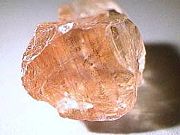 |
|
| Hostess | Miss Oregon Miss Oregon The Miss Oregon competition is a regional scholarship competition and beauty pageant that selects the representative for the U.S. state of Oregon in the Miss America pageant... |
Founded in 1947 as the Miss Oregon Pageant by merchants in the coastal city of Seaside Seaside, Oregon Seaside is a city in Clatsop County, Oregon, United States. The name Seaside is derived from Seaside House, a historic summer resort built in the 1870s by railroad magnate Ben Holladay. The city's population was 6,457 at the 2010 census.-History:... , the competition is a regional scholarship contest and beauty pageant Beauty contest A beauty pageant or beauty contest, is a competition that mainly focuses on the physical beauty of its contestants, although such contests often incorporate personality, talent, and answers to judges' questions as judged criteria... that selects the representative for Oregon in the Miss America Miss America The Miss America pageant is a long-standing competition which awards scholarships to young women from the 50 states plus the District of Columbia, Puerto Rico and the US Virgin Islands... pageant. The annual event includes contestants from across the state and awards scholarships to the participants. |
1969 |  |
|
| Insect | Oregon Swallowtail Oregon Swallowtail The Oregon Swallowtail is a species of swallowtail butterfly native to the U.S. states of Oregon, Washington, and Idaho and south-central British Columbia in Canada. In 1976, it became one of the first four butterflies that the United States Postal Service placed on a U.S... (Papilio oregonius) |
Containing the word Oregon in both its common and scientific names, this swallowtail species is native to the Northwest region, primarily found in the sagebrush Sagebrush Sagebrush is a common name of a number of shrubby plant species in the genus Artemisia native to western North America;Or, the sagebrush steppe ecoregion, having one or more kinds of sagebrush, bunchgrasses and others;... canyons of the Columbia River Columbia River The Columbia River is the largest river in the Pacific Northwest region of North America. The river rises in the Rocky Mountains of British Columbia, Canada, flows northwest and then south into the U.S. state of Washington, then turns west to form most of the border between Washington and the state... and its tributaries. |
1979 | 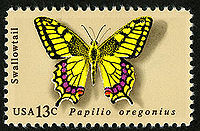 |
|
| Mother | Tabitha Brown Tabitha Brown Tabitha Moffatt Brown was an American pioneer emigrant who traveled the Oregon Trail to the Oregon Country. There she assisted in the founding of Tualatin Academy, which would grow to become Pacific University in Forest Grove, Oregon... |
Brown was a pioneer emigrant who traveled the Oregon Trail to the Oregon Country, where she helped to found Tualatin Academy Tualatin Academy Tualatin Academy was a secondary school in the U.S. state of Oregon that eventually became Pacific University. Tualatin Academy also refers to the National Register of Historic Places-listed college building constructed in 1850 to house the academy, also known as Old College Hall... , which would grow to become Pacific University Pacific University Pacific University is a private university located in Oregon, United States. The first campus began more than 160 years ago and is located about 38 km west of Portland in Forest Grove... in Forest Grove, Oregon Forest Grove, Oregon Forest Grove is a city in Washington County, Oregon, United States, west of Portland. Originally a small farm town, it is now primarily a bedroom suburb of Portland. Settled in the 1840s, the town was platted in 1850 and then incorporated in 1872 and was the first city in Washington County... . Brown was titled the "Mother of Oregon" for representing the "distinctive pioneer heritage and the charitable and compassionate nature of Oregon's people." |
1987 | ||
| Motto | Alis Volat Propriis Alis volat propriis Alis volat propriis is a Latin phrase used as the motto of U.S. state of Oregon.The official English version of the motto is "She Flies With Her Own Wings," in keeping with the tradition of considering countries and territories to be feminine... |
Latin Latin Latin is an Italic language originally spoken in Latium and Ancient Rome. It, along with most European languages, is a descendant of the ancient Proto-Indo-European language. Although it is considered a dead language, a number of scholars and members of the Christian clergy speak it fluently, and... for "She Flies With Her Own Wings", Alis Volat Propriis was the motto of Oregon from 1854 until it was changed to "The Union" in 1957. Written by Judge Jesse Quinn Thornton Jesse Quinn Thornton Jessy Quinn Thornton was an American settler of Oregon, active in political, legal, and educational circles. He served as the 5th Supreme Judge of the Provisional Government of Oregon, presented Oregon's petition for official territorial status to Congress, served in the Oregon Legislature, and... , the original motto was adopted once again by the 1987 Legislature. |
1987 1854–1957 |
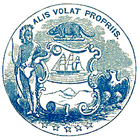 |
|
| Mushroom | Pacific Golden Chanterelle (Cantharellus formosus Cantharellus formosus Cantharellus formosus, commonly known as the pacific golden chanterelle, is a fungus native to the Pacific Northwest region of North America. It is a member of the genus Cantharellus along with other popular edible chanterelles. It was only recently distinguished from C. cibarius of Europe, and... ) |
Most known for its "golden hue, chalice shape and delicate woodsy flavor", the Pacific golden chanterelle is a fungus Fungus A fungus is a member of a large group of eukaryotic organisms that includes microorganisms such as yeasts and molds , as well as the more familiar mushrooms. These organisms are classified as a kingdom, Fungi, which is separate from plants, animals, and bacteria... found throughout Oregon's conifer forests. Tillamook State Forest Tillamook State Forest The Tillamook State Forest is a publicly owned forest in the U.S. state of Oregon. Managed by the Oregon Department of Forestry, it is located west of Portland in the Northern Oregon Coast Range, and spans Washington, Tillamook, Yamhill, and Clatsop counties. The forest receives large amounts of... annually produces one of the world's largest chanterelle harvests. |
1999 | 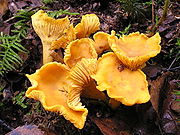 |
|
| Nut | Hazelnut Hazelnut A hazelnut is the nut of the hazel and is also known as a cob nut or filbert nut according to species. A cob is roughly spherical to oval, about 15–25 mm long and 10–15 mm in diameter, with an outer fibrous husk surrounding a smooth shell. A filbert is more elongated, being about twice... |
Hazelnuts, also known as filberts, are produced in commercial quantities in Oregon, which has an ideal climate for growing the nuts Nut (fruit) A nut is a hard-shelled fruit of some plants having an indehiscent seed. While a wide variety of dried seeds and fruits are called nuts in English, only a certain number of them are considered by biologists to be true nuts... . According to the state, Oregon's Willamette Valley Willamette Valley The Willamette Valley is the most populated region in the state of Oregon of the United States. Located in the state's northwest, the region is surrounded by tall mountain ranges to the east, west and south and the valley's floor is broad, flat and fertile because of Ice Age conditions... is home to 99% of the U.S. hazelnut industry. |
1989 |  |
|
| Rock | Thunderegg Thunderegg A thunderegg is a nodule-like geological structure, similar to a geode, that is formed within a rhyolitic lava flow.-Appearance and composition:... |
Nodule-like geological structures similar to geode Geode Geodes are geological secondary sedimentary structures which occur in sedimentary and certain volcanic rocks. Geodes are essentially spherical masses of mineral matter that were deposited sygenetically within the rock formations they are found in. Geodes have a Chalcedony shell containing... s, thundereggs are rough spheres found throughout Oregon, the largest deposits found in Crook Crook County, Oregon -Demographics:As of the census of 2000, there were 19,182 people, 7,354 households, and 5,427 families residing in the county. The population density was 6 people per square mile . There were 8,264 housing units at an average density of 3 per square mile... , Jefferson Jefferson County, Oregon Jefferson County is a county located in the U.S. state of Oregon. In 2010, its population was 21,720. It is named after Mount Jefferson. The seat of the county is Madras.-History:... , Malheur Malheur County, Oregon Malheur County is a county located in the southeast corner of the U.S. state of Oregon. It is included in the eight-county definition of Eastern Oregon. Most of the county observes the Mountain Time Zone, although the southern quarter of the county observes the Pacific Time Zone along with the... , Wasco Wasco County, Oregon Wasco County is a county located in the U.S. state of Oregon. The county is named for a local tribe of Native Americans, the Wasco, a Chinook tribe who lived on the south side of the Columbia River. In 2010, its population was 25,213... and Wheeler Wheeler County, Oregon As of the census of 2000, there were 1,547 people, 653 households, and 444 families residing in the county. The population density was 1 people per square mile . There were 842 housing units at an average density of 0 per square mile... counties. The world's largest thunderegg, a 1.75 ton specimen, is housed by the Rice Northwest Museum of Rocks and Minerals Rice Northwest Museum of Rocks and Minerals The Rice Northwest Museum of Rocks and Minerals is a non-profit museum in Hillsboro, Oregon, United States. Located just north of the Sunset Highway on the northern edge of Hillsboro, the earth science museum is in the Portland metropolitan area... in Oregon. |
1965 | ||
| Seal Seals of the U.S. states The following gallery displays the official seals of the 50 states, federal district, and territories of the United States of America:-See also:* Coat of Arms of the U.S. States* Seals of Governors of the U.S. States* Flags of the U.S. states... |
Oregon State Seal | In 1857, a resolution adopted by the Oregon Constitutional Convention Oregon Constitutional Convention The Oregon Constitutional Convention in 1857 drafted the Oregon Constitution in preparation for the Oregon Territory to become a U.S. state. Held from mid-August through September, 60 men met in Salem, Oregon, and created the foundation for Oregon's law. The proposal passed with a vote of 35 for... authorized the president to appoint a committee consisting of Benjamin F. Burch, La Fayette Grover La Fayette Grover La Fayette Grover was a Democratic politician and lawyer from the US state of Oregon. He was the fourth Governor of Oregon, serving from 1870 to 1877... and James K. Kelly James K. Kelly James Kerr Kelly was an American politician born in Pennsylvania. He was a United States Senator for Oregon from 1871 to 1877, and later Chief Justice of the Oregon Supreme Court... to design a new seal to be used once statehood was achieved. Harvey Gordon designed the seal, though additions were added through committee recommendations. Usage began after Oregon became the 33rd state on February 14, 1859. |
1859 | 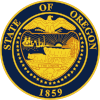 |
|
| Seashell | Oregon hairy triton Fusitriton oregonensis The Oregon hairy triton, Fusitriton oregonensis, is a species of large predatory sea snail, a marine gastropod mollusk in the family Ranellidae, the tritons.... (Fusitriton oregonensis) |
Named oregonensis by conchologist Conchology Conchology is the scientific or amateur study of mollusc shells. Conchology is one aspect of malacology, the study of molluscs, however malacology studies molluscs as whole organisms, not just their shells. Conchology pre-dated malacology as a field of study. It includes the study of land and... John Howard Redfield in 1846 to honor the Oregon Territory Oregon Territory The Territory of Oregon was an organized incorporated territory of the United States that existed from August 14, 1848, until February 14, 1859, when the southwestern portion of the territory was admitted to the Union as the State of Oregon. Originally claimed by several countries , the region was... , the Oregon hairy triton is covered with bristly periostracum Periostracum The periostracum is a thin organic coating or "skin" which is the outermost layer of the shell of many shelled animals, including mollusks and brachiopods. Among mollusks it is primarily seen in snails and clams, i.e. in bivalves and gastropods, but it is also found in cephalopods such as the... and found along the West Coast West Coast of the United States West Coast or Pacific Coast are terms for the westernmost coastal states of the United States. The term most often refers to the states of California, Oregon, and Washington. Although not part of the contiguous United States, Alaska and Hawaii do border the Pacific Ocean but can't be included in... , washing up at high tide. |
1991 | 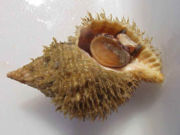 |
|
| Soil | Jory soil Jory (soil) The Jory series consists of very deep, well-drained soils that formed in colluvium derived from basic igneous rock. These soils are in the foothills surrounding the Willamette Valley. They have been mapped on more than in western Oregon... |
A very deep, well-drained soil Soil Soil is a natural body consisting of layers of mineral constituents of variable thicknesses, which differ from the parent materials in their morphological, physical, chemical, and mineralogical characteristics... that forms in colluvium Colluvium Colluvium is the name for loose bodies of sediment that have been deposited or built up at the bottom of a low-grade slope or against a barrier on that slope, transported by gravity. The deposits that collect at the foot of a steep slope or cliff are also known by the same name. Colluvium often... derived from basic igneous rock Igneous rock Igneous rock is one of the three main rock types, the others being sedimentary and metamorphic rock. Igneous rock is formed through the cooling and solidification of magma or lava... and found in the foothills surrounding the Willamette Valley Willamette Valley The Willamette Valley is the most populated region in the state of Oregon of the United States. Located in the state's northwest, the region is surrounded by tall mountain ranges to the east, west and south and the valley's floor is broad, flat and fertile because of Ice Age conditions... . These soils have been mapped on more than 300000 acres (1,214.1 km²) in western Oregon Oregon Oregon is a state in the Pacific Northwest region of the United States. It is located on the Pacific coast, with Washington to the north, California to the south, Nevada on the southeast and Idaho to the east. The Columbia and Snake rivers delineate much of Oregon's northern and eastern... and are named for the Jory family, who settled in the area in 1852 after traveling along the Oregon Trail Oregon Trail The Oregon Trail is a historic east-west wagon route that connected the Missouri River to valleys in Oregon and locations in between.After 1840 steam-powered riverboats and steamboats traversing up and down the Ohio, Mississippi and Missouri rivers sped settlement and development in the flat... . Jory soils are productive forest soils that support Oregon's stands of Douglas fir and Oregon white oak, as well as many Oregon crops, including Christmas tree Christmas tree The Christmas tree is a decorated evergreen coniferous tree, real or artificial, and a tradition associated with the celebration of Christmas. The tradition of decorating an evergreen tree at Christmas started in Livonia and Germany in the 16th century... s, berries, filberts, grass Grass Grasses, or more technically graminoids, are monocotyledonous, usually herbaceous plants with narrow leaves growing from the base. They include the "true grasses", of the Poaceae family, as well as the sedges and the rushes . The true grasses include cereals, bamboo and the grasses of lawns ... seed, and the grapes used in the Oregon wine Oregon wine The state of Oregon in the United States has established an international reputation for its production of wine. Oregon has several different growing regions within the state's borders which are well-suited to the cultivation of grapes; additional regions straddle the border between Oregon and the... industry. |
2011 | 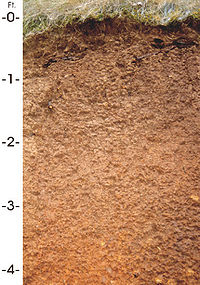 |
|
| Song | In 1920, the Society of Oregon Composers held a competition to select a state song. The winning entry was a collaboration between lyricist John Andrew Buchanan and composer Henry Bernard Murtagh. | 1927 | |||
| Statehood Pageant | Champoeg Champoeg, Oregon Champoeg is a former town in the U.S. state of Oregon. Now a ghost town, it was an important settlement in the Willamette Valley in the early 1840s. It is positioned halfway between Oregon City and Salem and the site of the first provisional government of the Oregon Country... Historical Pageant |
Each summer, the Champoeg Historical Pageant takes place at Champoeg State Park, where the first Oregon government was formed. The Oregon Parks and Recreation Department Oregon Parks and Recreation Department The Oregon Parks and Recreation Department , officially known as the State Parks and Recreation Department, is the government agency of the U.S. state of Oregon which operates its system of state parks... encourages the development of the pageant and promotes increased attendance at its performances. |
1987 | ||
| Team | Portland Trail Blazers Portland Trail Blazers The Portland Trail Blazers, commonly known as the Blazers, are an American professional basketball team based in Portland, Oregon. They play in the Northwest Division of the Western Conference in the National Basketball Association . The Trail Blazers originally played their home games in the... of 1990–1991 |
The Trail Blazers of 1990–1991 were designated as the official team of Oregon for their success in setting a franchise record of 63 victories, including a 16-game winning streak. | 1991 |  |
|
| Tree | Douglas-fir Coast Douglas-fir Pseudotsuga menziesii, known as Douglas-fir, Oregon Pine, or Douglas spruce, is an evergreen conifer species native to western North America. Its variety Pseudotsuga menziesii var. menziesii, also known as coast Douglas-fir grows in the coastal regions, from west-central British Columbia, Canada... (Pseudotsuga menziesii) |
Named after David Douglas David Douglas David Douglas was a Scottish botanist. He worked as a gardener, and explored the Scottish Highlands, North America, and Hawaii, where he died.-Early life:... , a Scottish botanist Botany Botany, plant science, or plant biology is a branch of biology that involves the scientific study of plant life. Traditionally, botany also included the study of fungi, algae and viruses... who traveled through Oregon in the 1820s, the douglas-fir is an evergreen conifer dominant throughout the region, occurring in nearly all forest types and able to compete Competition (biology) Competition is an interaction between organisms or species, in which the fitness of one is lowered by the presence of another. Limited supply of at least one resource used by both is required. Competition both within and between species is an important topic in ecology, especially community ecology... well on most parent materials and slopes. Due to its "strength, stiffness and moderate weight", the species is an invaluable timber product. |
1939 | 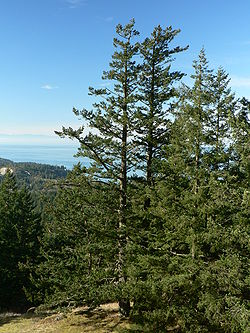 |
Unofficial symbols and unsuccessful proposals
While most states have an official nickname, the Oregon Legislature never officially adopted one. Oregon's unofficial nickname is "The Beaver State". Unofficial slogans for Oregon include "things look different here" and "Oregon. We Love Dreamers", the latter of which alludes to the "basic sense of idealism" of the state's culture.Several symbols have been proposed for addition to the list of official state symbols but were not adopted. The Oregon Waltz was approved as the state waltz by the Oregon House in 1997, but the proposal did not succeed in the Senate. In 2001, legislation designating the Kiger Mustang
Kiger Mustang
Kiger Mustang is substrain of Mustang horse located in the southeastern part of U.S. state of Oregon. Originally feral horses with specific conformation traits discovered in 1977, the name also applies to their bred-in-captivity progeny....
, a horse breed unique to southeastern Oregon, as the state horse was introduced, but not adopted. It was suggested in 2003 that Oregon have an official state tartan, but the bill never passed out of committee.

